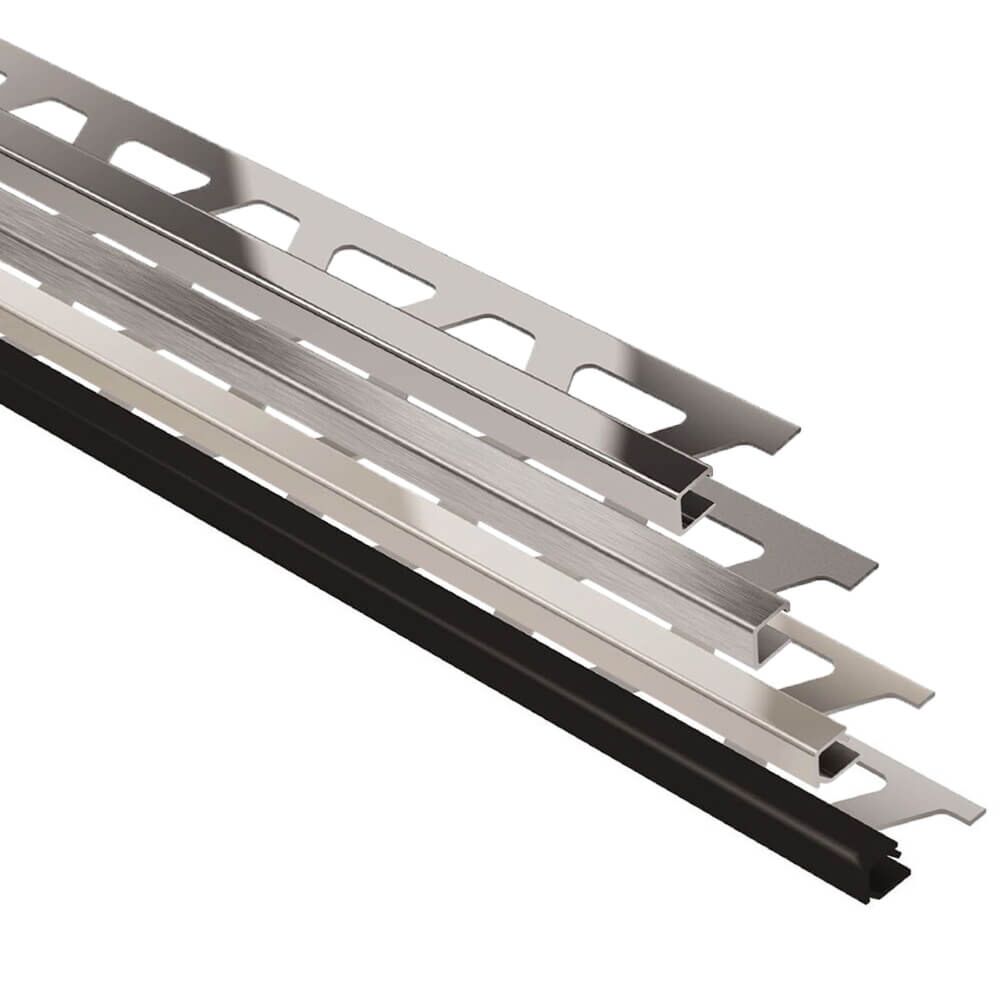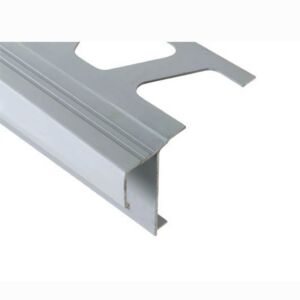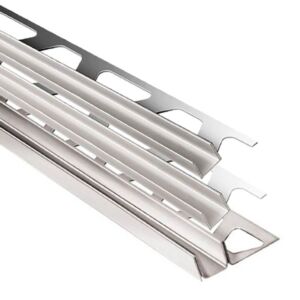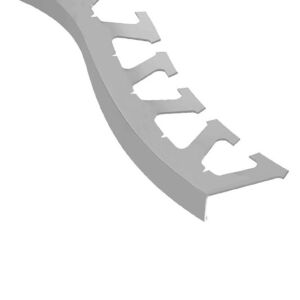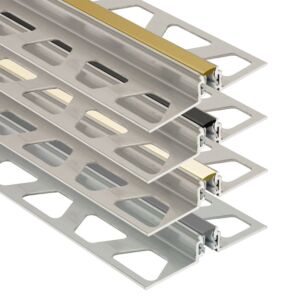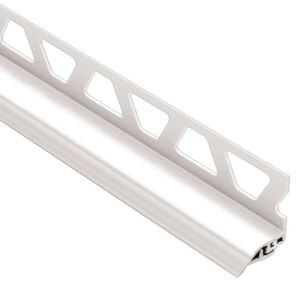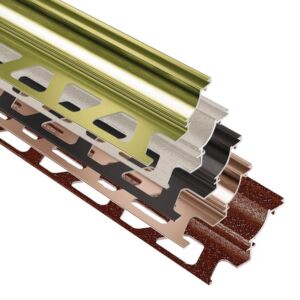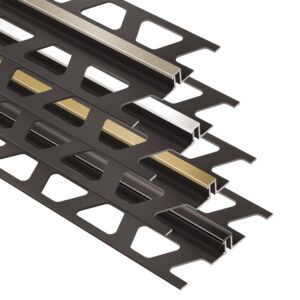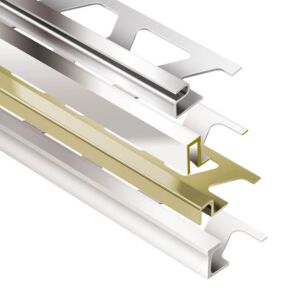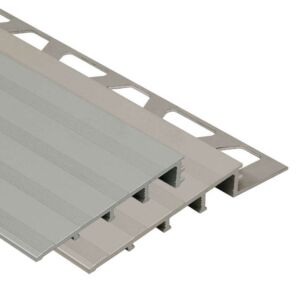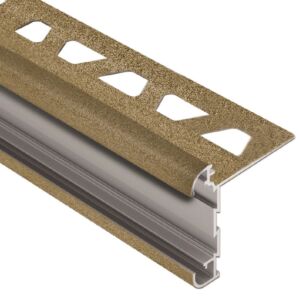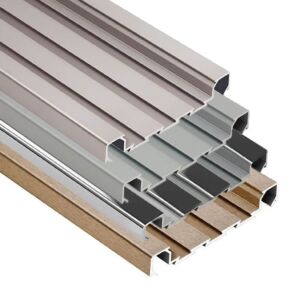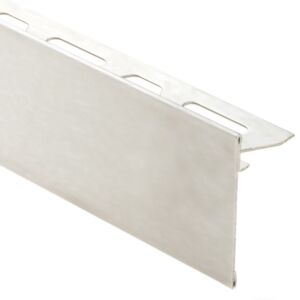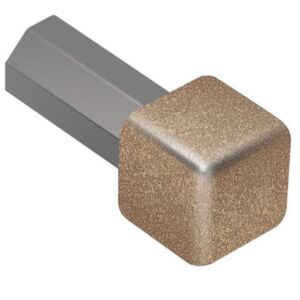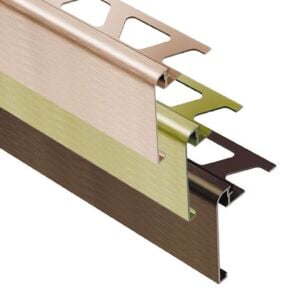Schluter QUADEC Square Edge Tile Edging Trim - 8 ft. 2-1/2 in.
Brand: Schluter
Availability: Ships from Factory (More Info)
Shipping: $49.95 Flat rate ground shipping for unlimited Schluter products in this order. Some exclusions apply.(More Info)
Schluter QUADEC is a finishing and edge-protection profile for the outside corners of tiled surfaces. It features a trapezoid-perforated anchoring leg that is secured in the mortar bond coat beneath the tile and a reveal that forms a square outer corner along the surface edge.
The profile is available in stainless steel, anodized aluminum and color-coated aluminum. QUADEC allows for modern decorative design and interesting contrasts. The profile can be combined with the QUADEC-FS feature strip profile and the DESIGNLINE border profile for further design options. In addition to its decorative effect, the profile protects tile edges against damage caused by mechanical stresses. Schluter QUADEC, in stainless steel, is particularly resistant to wear when used as edge protection. It may also be used as a stair nosing or floor transition profile. In addition, QUADEC is suitable for transitions, corners, or dado coverings with other covering materials; for example, carpet, parquetry, natural stone tiles, or poured epoxy coverings. The integrated joint spacer forms a defined joint cavity with the tile.
Note: Schluter QUADEC in stainless steel does not feature the integrated joint spacer. Matching inside/outside corners and connectors are available.
- Prevents tile edges from chipping
- Can be incorporated as an accent within tile fields on floors and walls
- Create modern decorative designs, interesting contrasts, and match with tile and grout
- Combine with QUADEC-FS and/or DESIGNLINE for increased design options
- QUADEC in stainless steel can be used as a stair nosing or floor transition profile
- Available in stainless steel, anodized aluminum, textured and color-coated aluminum
Schluter Edging Trim Installation
- Select the profile according to tile thickness and format.
- Using a notched trowel, apply thin-set mortar to the area where the profile is to be placed. If the JOLLY, QUADEC, RONDEC, RONDEC-DB, DECO-DE, FINEC, or FINECSQ profile is to be used as edging for an outside wall corner, finish tiling one wall first; then trowel thin-set mortar over the corner area of the second wall.
- Press the perforated anchoring leg of the profile into the mortar and align.
- Trowel additional thin-set mortar over the perforated anchoring leg to ensure full coverage and support of the tile edges.
- Solidly embed the tiles so that the tiled surface is flush with the top of the profile; the profile should not be higher than the tiled surface, but rather up to approx. 1/32" (1 mm) lower.
- Set the tile to the integrated joint spacer, which ensures a uniform joint of 1/16" - 1/8" (1.5 - 3 mm). With the stainless steel profiles, leave a space of approximately 1/16" - 1/8" (1.5 - 3 mm).
- Fill the joint completely with grout or setting material.
- Work with materials and tools that will not scratch or damage sensitive surfaces. Setting materials must be removed immediately, especially from aluminum.
Note: Matching corners and connectors are available. Corners are held in place with thin-set mortar. Fill the ends of the profile with thin-set mortar prior to inserting the accessories. Connectors are held in place with a friction fit. Insert the connector into the profile approximately half the length of the connector piece and connect the adjacent profile.
How do I cut profiles?
Schluter™ profiles are available in a variety of different materials , so methods for cutting vary. Below are best practices for cutting according to material type.
Plastic
Plastic profiles may be cut using Schluter™-SNIPS or similar. It is important to make sure the blade is sharp in order to ensure a clean cut.
Aluminum
One option for cutting aluminum profiles is to simply use a hacksaw. Look for a bimetal blade and select the highest teeth per inch, or TPI, available. A miter box is recommended to help ensure a straight cut. Aluminum profiles may also be cut using a variable-speed angle grinder with the Schluter-PROCUT-TSM cutting wheel. Set the angle grinder to the lowest speed. A clamp or cutting jig can be used to secure the profile and help ensure a straight, clean cut. Finally, aluminum profiles can also be cut using a chop saw or miter saw with a non-ferrous blade. After cutting, make sure to remove any burs with a file before installation.
Brass
Brass profiles can be cut by using a hacksaw with a bimetal blade with the highest teeth per inch available, or by using a chop saw or miter saw with a non-ferrous blade. Removing any burrs from the cut end of the profile with a file (or similar) is also recommended.
Stainless Steel
The simplest option for cutting stainless steel is to use a variable-speed angle grinder with the Schluter-PROCUT-TSM cutting wheel. Set the angle grinder to the lowest speed. Another option for cutting stainless steel profiles is to use a band saw with a metal cutting blade. After cutting, make sure to remove any burs with a file before installation.
| SKU | S-QUADEC |
|---|---|
| Weight (lbs.) | 0.38 - 1.73 |
| Non-Returnable | No |
| Manufacturer | Schluter |
| Warranty | 5 Year Limited Warranty |
| Dimensions (L x W x H) | 8' 2-1/2" x 63/64" x 15/64" - 8' 2-1/2" x 1 27/64" x 41/64" |
| Trim Material | Aluminum |
| Trim Length | 8' 2-1/2" |

